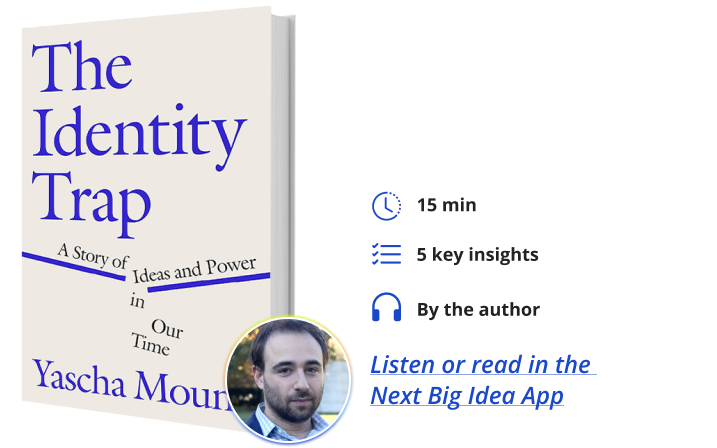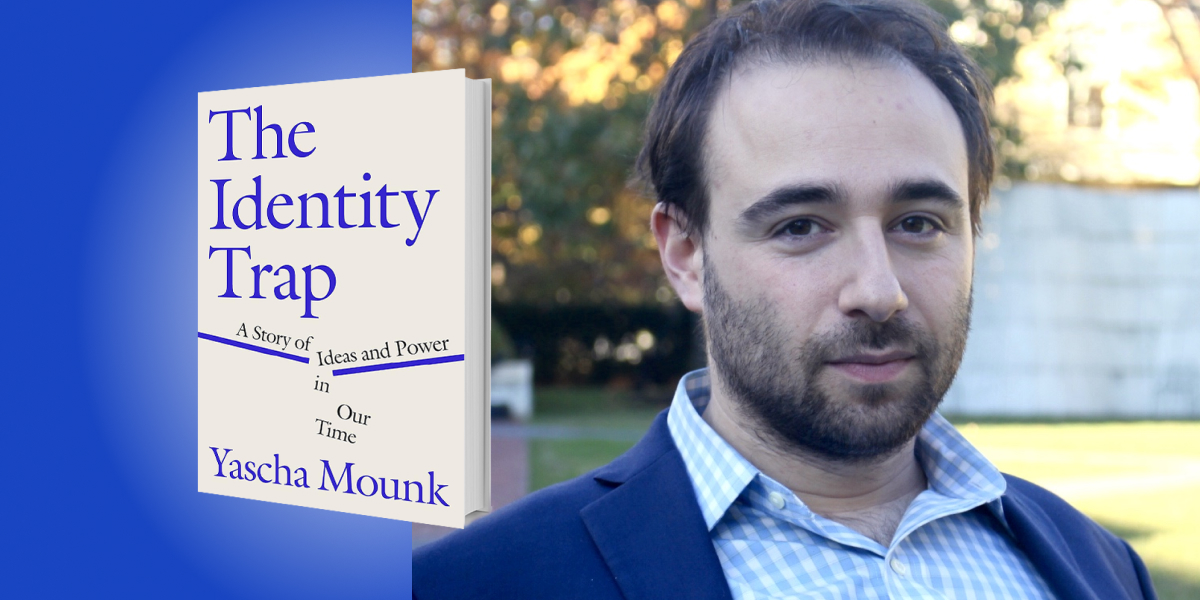Yascha Mounk is a writer and professor of the practice of international affairs at Johns Hopkins University. He received his BA in history from Trinity College Cambridge and his PhD in government from Harvard University. He is also the founder of the digital magazine Persuasion, a contributing editor at The Atlantic, and a senior fellow at the Council on Foreign Relations.
Below, Yascha shares five key insights from his new book, The Identity Trap: A Story of Ideas and Power in Our Time. Listen to the audio version—read by Yascha himself—in the Next Big Idea App.

1. Beware of the identity trap.
A trap has a lure. It has something that draws people in. These ideas do that by claiming that they are most likely to eliminate racial and other injustices that persist in the United States and in other democracies today. But a trap also gets people stuck. It makes the situation worse.
This is true of the identity trap, which is a political trap. It promises to make the world a better place for minority groups, but it often makes it worse for everyone. It has sown dissension and chaos in progressive institutions, making it harder for them to fulfill their important missions. It encourages all of us, including white people, to “embrace our racial identity” in a way that will actually undercut solidarity between different groups.
Finally, while it is seemingly opposed to right-wing populists like Donald Trump, in reality, one is the yin to the other’s yang. The rise of the identity trap has actually made it easier for true reactionaries to win political power.
The identity trap is also a personal trap. It promises people that they will find the recognition and respect they seek by defining themselves in terms of a particular intersection of identities at which they stand. But to feel like a true equal in society, to feel seen in society, we actually need to be perceived as individuals as well. While we obviously have to overcome discrimination against identity groups, against minority groups, a true sense of belonging in society cannot come from being primarily understood and seen as a function of the groups into which we were born. That is why the set of ideas, well-intentioned as they might be, are both a political and a personal trap.
2. There’s no reason to be scared of healthy cultural exchange.
There is now a growing taboo against something that people call “cultural appropriation.” Some of the things that go under that label are unjust, like the white musicians who stole songs from Black musicians in the 1950s and 1960s. But virtually always, the things that make those situations morally bad, the wrong-making features of those situations, can be expressed in a much more straightforward way. What was wrong about those musicians is that their Black counterparts were not able to sign big record contracts. They were not allowed to perform in many concert halls across the American South at the time. It was discrimination which was the real injustice.
“This kind of concern for cultural purism has always been a hallmark of far-right political activists of the worse kinds of nationalists.”
It is a mistake to conclude from these examples that any time a member of one cultural group is inspired by, collaborates with, seizes upon elements of a culture of another group, that it is something we should worry about. This kind of concern for cultural purism has always been a hallmark of far-right political activists of the worse kinds of nationalists. A huge part of a cultural richness of humanity consists in things that bear the hallmarks, the influence of many different cultures. So, rather than being afraid of mutual cultural exchange, we should recognize it as a strength, as one of the signs of strength of a diverse society.
3. Free speech is fundamentally important.
The reason why free speech is important is not the good things that we get it. Rather it is the terrible things that happen when we lose free speech. Historically, some of the most influential philosophers, like John Stuart Mill, have made the argument for free speech by talking about the wonderful things that will flow from it. They talk about free speech allowing us to pursue the truth, making it easier for unpopular truths to survive their age until finally they are broadly recognized. These philosophers talk about the importance of having disagreements in society, even disagreements with ideas that are true. Disagreements are what we need in order to hold beliefs as living truths, rather than as dead dogmas.
But why we should put up with the kinds of disgusting things that people sometimes say on social media, some critics may ask? I don’t think that these aspirational values are enough. To explain why it is so dangerous to give governments or tech companies the power to censor us, we need to focus on the bad things that will happen if we lose free speech.
The first of these is quite simply is that the people who are in a position to censor are not going to be those without power. They are going to be the powerful. It is tempting to imagine that the censors will always be on the side of the good, but in reality there’s going to be tremendous competition over who gets to make those decisions. A lot of the time, the worst kinds of people who don’t care at all about the suffering of a weakened society are going to be pulling the trigger.
“People who are in a position to censor are not going to be those without power.”
Second, a key element of our democracies is that we decide who gets to rule through free and fair elections. And one of the reasons why losers of elections tend to put up with that is that they know they can go home, make their case to be electorate for another four years and come back to power at the end of that time period. Free speech is a key element of that reassurance.
If losing an election may also entail losing the right to make the pitch to the fellow citizens, the losers are going to be more tempted to stay in power by any possible means, including by means of destroying democratic institutions. So free speech protects the vulnerable from the powerful, as Frederick Douglass realized when he called it, “The dread of tyrants.” Free speech makes it easier for us to sustain democratic institutions even at a time of rising polarization.
4. We can take injustice seriously without embracing “wokeness” or going “woke.”
Three fundamental claims stand at the heart of the identity synthesis, and all of them are deep criticisms of the basic values of liberal democracy or philosophical liberalism.
The first is that identity categories like race, gender, and sexual orientation are the principle, the primary prism through which we should understand society. As one author influenced by this tradition claims, “Anytime a white person interrupts a Black person, they’re bringing the whole apparatus of white supremacy to bear on them.” This might be true even if they’re friends, even if they’re lovers, even if they’re family members who habitually interrupt each other.
Second, they claim that any set of universal values or neutral rules, like those enshrined in the United States Constitution, are merely trying to pull the wool over people’s eyes in order to cloak the forms of racial and gender and other discrimination that has historically persisted in the United States and in other countries.
The third claim is that therefore we are not going to make progress by trying to live up to those universal values, to those neutral rules. Rather, we must reject them root and branch. We must make how people are treated by the state and how they treat each other explicitly depend on the identity group of which they are apart.
I believe that it’s possible to take the history and the persistence of identity-based forms of injustice, of racism and sexism and other terrible social realities very seriously without embracing any of these three claims.
“The United States has historically failed to live up to its universal values and its neutral rules.”
Here are my responses to the free criticisms of philosophical liberalism of basic constitutional values. The first is to say that race, gender, and sexual orientation are one prism for understanding what goes on in society, an important prism. But there are also others that are equally important, from class to religion to personal demeanor and behavior, to all kinds of other ways to understand reality. How to interpret a situation depends on the particular situation at hand. We cannot impose a predetermined perspective on it.
Secondly, it is of course true that the United States has historically failed to live up to its universal values and its neutral rules. But because of a long tradition of political thought, including a long tradition of Black political thought that spans from Frederick Douglass to Martin Luther King Jr to Barack Obama, we have been able to make tremendous progress. Because what these thinkers said was, “By what virtue are you excluding us from those values? How can you continue to hold these beliefs about your country when you are cruelly excluding us from the enjoyment of them?”
Martin Luther King pointed out that the check which African-Americans had been written was invalid, but he demanded that the Bank of Justice cash that check. He did not encourage his fellow members of the civil rights movement to rip up that check. Therefore, the answer is not to give up on universal values or neutral rules, the answer is to double-down on our effort to live up to them, to create a society in which how you are treated and how we treat each other truly becomes less dependent on who we are because we have managed to eliminate many of the injustices that persist in society today.
5. Claim the moral high ground when arguing against the identity trap.
I have noticed that many of my friends and colleagues are scared about criticizing these ideas. The defendants of the identity synthesis are often genuinely well-intentioned, and sometimes they take offense at anybody who disagrees with them. They also try to paint those who disagree with the brush of somehow being ill-intentioned or being reactionaries. There’s a great temptation when that accusation is made against you to seize the moral high ground from the beginning.
Some of my friends and colleagues start to apologize profusely for what they’re about to say before they even express their own opinion. Others assume that they’re going to make themselves unpopular.
But I have thought carefully about “The Identity Trap” because I’m deeply convinced of my own moral values, because I’m arguing for a set of ideas that might turn out to be wrong, but that I genuinely believe to be a better guide to building a just society. Therefore, you shouldn’t be either apologetic or rude in anticipatory obedience of being vilified when arguing against these ideas. Treat your interlocutors as people who might be persuaded, who may change their mind, who may agree with you on many of these points, who are likely to be reasonable in how they too view the world. Argue from a position of reflected conviction and claim the moral high ground.
To listen to the audio version read by author Yascha Mounk, download the Next Big Idea App today:
































